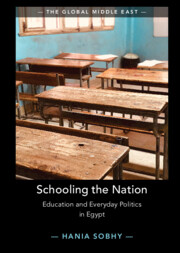‘This is a fascinating and ground-breaking book. With verve and rigor, Hania Sobhy shows how the impoverished financial and managerial conditions of the education sector in Egypt have made it totally inept. Instead, young Egyptians in school learn a mix of unenforced rules that breed cynicism and corruption, and pervasive violence through which money, class, and male power rules.’
Ishac Diwan - École Normale Supérieure and Paris Sciences and Lettres
‘Set at the cusp of the late-Mubarek and Arab uprisings period, this immersive, richly documented ethnography of schooling takes us to the heart of everyday governance in Egypt. It reveals the workings of lived citizenship under ‘permissive-repressive neoliberalism’ and how everyday repression and violence are mediated by class and gender. A must-read for students of Middle Eastern studies, political sociology and comparative education at all levels.’
Deniz Kandiyoti - SOAS University of London
‘In this closely observed and theoretically rich ethnography, Hania Sobhy has done something remarkable: presented us with a detailed, honest, and often tragic portrait of student experience in half a dozen Egyptian secondary schools. Describing the combination of everyday violence and neglect that shapes students’ experiences, she outlines the increasingly degraded forms of citizenship available to the youth of the region.’
Gregory Starrett - University of North Carolina at Charlotte
‘Schooling the Nation is a path-breaking and sobering account of public education in Egypt. Extensively researched, Sobhy highlights the centrality of schools as spaces of lived citizenship. She brilliantly makes the case for an educational system under neoliberalism that is both permissive and repressive. This book will be essential reading for anyone interested in education, citizenship and living under neoliberalism.’
Fida Adely - Georgetown University
‘This outstanding political ethnography of Egyptian public schools offers rich systematic observations on the intersection of violence and marketization in the lives of students. Sobhy yields original insight into the operations that engender deeply differentiated experiences and imaginations of citizenship among youth. An important contribution to the scholarships of Egypt, the MENA region, and comparative education.’
Charis Boutieri - King's College London
‘A fascinating in-depth analysis of education, citizenship and belonging in contemporary Egypt based on exceptional ethnographic fieldwork. I have been assigning Sobhy’s earlier work in my classes and have seen the engagement and debate it creates among students. Now that the book is out, Schooling the Nation will no doubt become essential reading in graduate and undergraduate courses on the sociology, anthropology and politics of the Middle East and the Global South.’
Nadine Adballa - American University in Cairo
‘Its insightful analysis and thought-provoking arguments make it essential reading for anyone interested in understanding the complexities of education in Egypt and its broader societal implications.’
Mai Atta
Source: Political Science Quarterly
‘… a compelling empirical study of the triangular relationship between the people, the state, and the nation.’
Kaoutar Ghilani
Source: Mediterranean Politics
‘It extends significant works such as those of Timothy Mitchell, Kamal Naguib or Iman Farag by placing itself in a perspective which, while taking note of Bourdieu's sociology of social reproduction through school, is situated on a more political angle which is that of access to citizenship in all its variants … Drawing on the findings of Foucault's historical analysis of the mechanisms of training bodies and minds in Discipline and Punish, the spotlighting of the facts drawn from this assiduous observation in Egyptian classrooms today is impressive.’
Bernard Botiveau
Source: Revue des Mondes Musulmans et de la Méditerranée
‘Sobhy's work, through its reflection on permissiveness, the erosion of disciplinary institutions, noncompliance and the incoherence of legitimation narratives, offers new avenues for elucidating the dynamics of state functioning in the neoliberal context and offers, beyond an ethnographic analysis of the education system, an enlightening and disturbing perspective on current Egypt.’
Farah Ramzy
Source: Mondes Arabes



